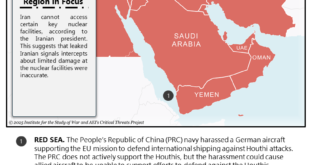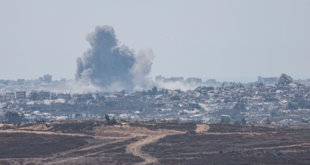BEIRUT — Abu Abbas, a car dealer from south Lebanon, has ready answers to the litmus-test question which has traditionally split his country down the middle — whether it should opt out of the Arab-Israeli conflict.
Lebanon is an inseparable part of the Arab world, he says, and conflict with Israel is inevitable as long as any Arab land remains under Israeli occupation or Israel even exists.
“When I see Palestinians in Gaza and the West Bank suffering every day, the victims of racism and destruction, I consider that to be an attack on all humanity,” said the 30-year-old bachelor, who supports the Shiite Muslim movement Hizbollah.
Abu Abbas lives in the southern suburbs of Beirut, where hundreds of thousands of Shiite Muslims from the south have settled over the past three decades and where the Shiite movement has a large and loyal following.
Shiites say Hizbollah and its weapons are needed to defend Lebanon against Israel, but many disagree in a country where politics have always been shaped by sectarian divisions, which fuelled a long civil war.
Many Christian, Sunni Muslim and Druze leaders are part of a coalition which wants Lebanon to distance itself from any conflict with Israel.
Poorer than average, under-represented in the religion-based system which governs Lebanese politics, but demographically on the rise, the Shiites feel empowered by the outcome of the one-month war between Israel and Hizbollah in July and August.
“The Divine Victory” and “A Victory from God” read the slogans on Hizbollah billboards along Hadi Hassan Nasrallah Avenue, a main street named for the eldest son of Hizbollah leader Sayyed Hassan Nasrallah.
Hadi died fighting the Israelis in 1997 and the slogans are a tribute to the family name, which means “God’s victory” in Arabic.
“I can’t express in words how humble and brave, how honest and sincere is Hassan Nasrallah. He is in the people’s hearts,” said Abu Abbas, a view heard again and again in Shiite society.
Less than 3km (two miles) away, in the middle-class Christian-dominated district of Ashrafiyeh, the mood is rather different after the latest round of conflict with Israel.
During the civil war, which lasted from 1975 to 1990, this was a stronghold of right-wing Christian militias with a world view diametrically opposed to that of Hizbollah.
Â
Enemy’s enemy
Â
Many of the militias played down Lebanon’s Arab identity, emphasising the Phoenician and Mediterranean elements in the country’s heritage. They took up arms largely in response to the armed presence in Lebanon of Palestinian refugees, who were dragging their country into conflict with Israel.
Some cooperated with Israelis, on the principle that my enemy’s enemy is my friend. But in the end, they failed to impose their vision on the country as a whole or create a viable enclave in the territory they controlled north of Beirut.
Ashrafiyeh Christians now offer a more diverse range of opinions, reflecting the political divisions within the Christian community and their more modest ambitions.
Half of their politicians are allied to the pro-business and anti-confrontation faction which dominates the government, while others are loyal to former Christian military leader Michel Aoun, who has taken sides with Hizbollah on nationalist grounds.
Far from promoting secession or reliance on a sectarian militia, some Christians said they favoured strengthening the Lebanese state. Others said Hizbollah had fought for a just cause and had shown impressive military prowess against Israel.
But Tony Khouri, a driver in his 50s, said: “Lebanon should withdraw from any conflict and be neutral. Bigger states like Egypt have pulled out and Egypt has 70 million people.” “All of us are for the state, a strong state and a strong army, and we don’t care for the political parties. Hizbollah should close down and its fighters join the army,” he added.
But even Khouri blamed Israel for the latest war, which killed close to 1,200 people in Lebanon — most of them civilians who died in Israeli air raids and shelling — and 157 Israelis, mostly soldiers.
“It’s Israel that did all the damage. Israel is famous for its destruction. What does Hizbollah have to do with the Jounieh Bridge, for example?” he said, referring to a bridge north of Beirut, in an area where Hizbollah has no presence.
The war also exposed the weakness of the Beirut government.
Critics of the system say a stable and strong state requires an end to the sectarian system of government in which official posts are assigned on the basis of religion.
Back in Beirut’s Shiite suburbs, Abu Abbas said he saw no need for Nasrallah to give up war against Israel, disarm his military wing or turn himself into a mainstream politician.
“For us, jihad [holy war] is a duty and as long as Israel exists there cannot be peace. People are proud of their martyrs.
In fact, the martyrs don’t die. It is us who are dead,” he said.
 Eurasia Press & News
Eurasia Press & News


